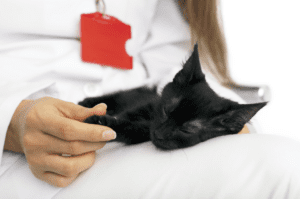Vomiting and Diarrhea in Dogs
 As a dog owner, seeing your healthy, normally food-loving canine companion start vomiting and having diarrhea can be quite alarming. Since these symptoms are often associated with several devastating illnesses, including Parvo and Distemper, it’s important that you know what to do and when to panic (and by panic, we mean calmly bring your dog to the vet).
As a dog owner, seeing your healthy, normally food-loving canine companion start vomiting and having diarrhea can be quite alarming. Since these symptoms are often associated with several devastating illnesses, including Parvo and Distemper, it’s important that you know what to do and when to panic (and by panic, we mean calmly bring your dog to the vet).
However, while it’s common for vomiting and diarrhea to develop as a sign of a serious complication, that’s not always the case. Most veterinarians even recommend trying out a few at-home remedies first before heading to the animal clinic. Read about that and more down below!
When Should I Be Concerned?
Vomiting and diarrhea can signify a minor intestinal problem or a potentially life-threatening condition—it mainly depends on your dog’s current health status and the symptoms that develop alongside it. For puppies and senior dogs, especially ones that are already suffering from a particular illness, vomiting and diarrhea usually calls for a trip to the vet.
How Do I Know If It’s a Sign of Distemper?
 Normally, when vomiting is caused by a minor complication, dogs don’t lose their appetite. That means they’ll still be willing to eat and drink, but simply have trouble keeping everything down.
Normally, when vomiting is caused by a minor complication, dogs don’t lose their appetite. That means they’ll still be willing to eat and drink, but simply have trouble keeping everything down.
Distemper, on the other hand, usually causes dogs to lose all interest in both food and water. So if your dog is infected, you’ll most likely notice that the color of their vomit is a bit yellowish or brownish. This is because as your dog refuses food and the disease progresses, they may start vomiting a mixture of food particles, bile, and blood (due to the virus damaging the intestinal tract).
In addition, Distemper is generally accompanied by fever, eye and nose discharge, lethargy, and hardening of the paw pads.
What Causes It?
Aside from Distemper, vomiting and diarrhea may happen as a result of your dog eating foreign or inedible material (bones, twigs, toys, garbage, spoiled food), indigestion, a parasitic worm infestation, organ failure, or cancer. To narrow down the list of possible causes and be able to act quickly when needed, always pay attention to other signs that develop.
Vomiting and diarrhea alone rarely indicate major complications, but when other symptoms start making an appearance, then it’s best to contact your veterinarian right away.
What Can I Do for My Dog at Home?
 According to PetMD, if your dog is vomiting, it’s recommended that you withhold food (but not water) for about 12 to 24 hours. Within those hours, monitor your dog’s condition and assess whether or not they’re getting better. After 12 to 24 hours, you can slowly reintroduce solid food.
According to PetMD, if your dog is vomiting, it’s recommended that you withhold food (but not water) for about 12 to 24 hours. Within those hours, monitor your dog’s condition and assess whether or not they’re getting better. After 12 to 24 hours, you can slowly reintroduce solid food.
For diarrhea, there’s no need to withhold food. Instead, feed your dog bland, easily digestible foods, such as boiled, unseasoned chicken breast (no skin) and white rice. Once their stools return to normal, gradually switch to their regular diet or one that’s nutritionally balanced.
Throughout their recovery period, make sure that your dog drinks plenty of water and receives supplemental electrolytes, whether in the form of a drink or a dog treat, to replenish lost fluids and prevent dehydration.
How Is Diarrhea and Vomiting Treated at the Vet?
 If you bring your dog to the vet, your veterinarian will need to find out the main cause of vomiting and diarrhea to provide an appropriate treatment plan. Generally, physical and fecal examinations, blood work, urinalysis, x-ray, ultrasound, and endoscopy (insertion of a thin tube into the hollow part of an organ for examination) is done.
If you bring your dog to the vet, your veterinarian will need to find out the main cause of vomiting and diarrhea to provide an appropriate treatment plan. Generally, physical and fecal examinations, blood work, urinalysis, x-ray, ultrasound, and endoscopy (insertion of a thin tube into the hollow part of an organ for examination) is done.
Depending on the final diagnosis, your veterinarian may suggest that your dog be admitted for around-the-clock veterinary care. This typically involves the provision of anti-emetics (prevents vomiting), antibiotics, IV fluids, supplemental electrolytes, tube feeding.






